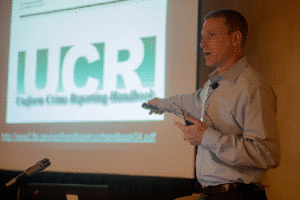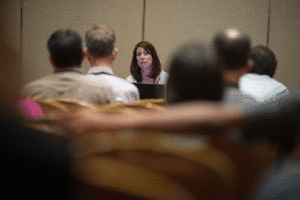Posts by hdcoadmin
You’ve got the data, where’s the story? How to find interesting patterns and do analysis
By Kathryn Sharkey Data can be overwhelming, so when it comes to finding the story in it all, Dan Keating from the The Washington Post and Jacob Fenton from the Sunlight Foundation agree: start small. Review the information and look for what’s interesting and jumps off the page. Fenton’s three-step guide to a story is…
Read MoreStaying on the paper trail of a major business
By Zachary Matson Businesses may control the world, but they also leave paper and people trails everywhere they go. Resources as basic as a company’s website and resources as complex as analytic tools created by financial firms can be used by journalists to tell important stories about what public and private companies are up to.…
Read MoreDelving into crime data and finding flaws
By Zachary Matson and Meredith Turk Steve Thompson, from The Dallas Morning News, speaks during the panel “Juking the stats? Delve into your police department’s FBI crime data to find flaws” on Thursday. Photo: Travis Hartman. When it comes to FBI crime statistics, “I can’t think of a number that means more to a community…
Read MoreA demo of Census Reporter, designed to help journalists highlight what matters in the census
By Gwen Girsdansky Census data can be difficult and cumbersome, and certainly not tailored toward the average journalist’s needs. Census Reporter is a young project, funded by the Knight Foundation, that is supposed to make the data easier for journalists to use and to provide an extensive update to the IRE census project, census.ire.org. As…
Read MoreDealing with inaccessible data and finding a needle in a million haystacks
By Jordan Gass-Poore’ Amanda Zamora of ProPublica answers questions during a panel on how to build a thorough data-based investigation with inaccessible, incomprehensible, and indeterminate data. Photo: Travis Hartman. Leading journalism professionals spoke about the search for finding meaning in messy data during Thursday morning’s session “Finding the needles in a million haystacks: How to build…
Read MoreHow the IRE Conference comes together, in pictures
After months of planning, the final pieces of the IRE Conference all come together on a very busy Wednesday. It starts with boxes. Shipped from the IRE offices in Columbia, Mo., and elswhere, those boxes reside with one of the host organizations — this year the San Antonio Express-News — until they’re hauled over to…
Read MoreMobile apps reporters can use
Stephen Stock of NBC Bay Area gave a popular presentation Wednesday morning focused on mobile apps that journalists can use, including some lesser-known but highly useful ones such as Wickr, which facilitates secure communication, or RecordMyCall, which can record outgoing and incoming phone calls on an android phone . He compiled a list of helpful apps…
Read MoreIRE Conference schedule changes as of Wednesday
Below are changes made to the IRE Conference schedule as of Wednesday. For the most up-to-date schedule and description information, be sure to visit the conference page or download the conference app. THURSDAY Speaker change: Inspect This | 11:20 a.m. in Salon JJames Drew, The Dallas Morning News, replaces Tom Frank, USA TODAY, on this…
Read MoreIRE to offer computer-assisted reporting boot camp at Temple University
IRE will be offering a computer-assisted reporting boot camp at Temple University in Philadelphia, Penn., August 19-22. During these four days attendees will be introduced to analyzing data for stories with spreadsheets and database managers. In addition, they’ll learn ways to find data, craft open records requests and negotiate for electronic information. Because of the generosity…
Read MoreMaking the reporting transparent after an agency demands retraction
For the past several months, we at inewsource have been reporting on San Diego’s North County Transit District, a public transportation agency that is going through a bit of turmoil — to put it politely. The district has been aggressive in its response to our stories. It’s sent out dozens of tweets calling us “just…
Read More The early bird deadline for
The early bird deadline for 

